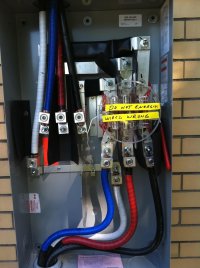jar546
Forum Coordinator
In the bottom of this meter base you will find the cut in card of another inspector from a third party agency in Pennsylvania.
First of all this was a 120/240 3-phase Delta which means there is a 208 high leg. What you can't see on the orange sticker behind the first phase is a note specifying where the high leg goes.
Not only did the contractor wire it wrong but they also used the wrong color tape because they did not even know what the voltage was for the 3 phase service that they were replacing. Amazing!
I was alerted by the POCO whose technician found this problem in my jurisdiction at the time. Apparently the contractor decided not to pull a permit and got another inspector to come in so he could get a cut in card to the POCO without me knowing.

First of all this was a 120/240 3-phase Delta which means there is a 208 high leg. What you can't see on the orange sticker behind the first phase is a note specifying where the high leg goes.
Not only did the contractor wire it wrong but they also used the wrong color tape because they did not even know what the voltage was for the 3 phase service that they were replacing. Amazing!
I was alerted by the POCO whose technician found this problem in my jurisdiction at the time. Apparently the contractor decided not to pull a permit and got another inspector to come in so he could get a cut in card to the POCO without me knowing.

Last edited:
